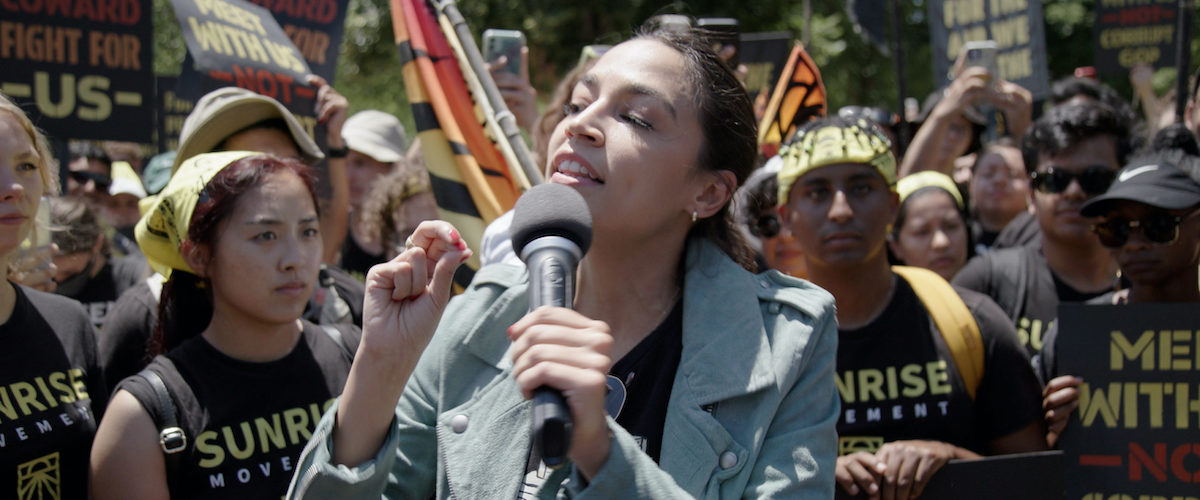In Rachel Lears’ compelling 2019 documentary, “Knock Down the House,” her “fly-on-the-wall” camera follows four progressive candidates on the campaign trail. Only one of them, Alexandria Ocasio-Cortez of New York, won her election, showing how difficult it can be for progressive candidates hoping to unseat well-established opponents—but that it can be done. The year after the film, another one of the documentary’s subjects, Cori Bush, won her election in Missouri. Things, at least for the moment, looked a little more hopeful than they had during the depths of the Trump administration.
However, Lears’ follow-up to “Knock Down the House,” “To the End,” is slightly different. The observational camera work is the same, but the narrative structure, subject, and tone have changed. This time, the film’s focus is on climate change, narrowing in on the experiences of newly minted Representative Ocasio-Cortez, who champions immediate policy action to save the planet, the spirited activist Varshini Prakash, Co-founder and Executive Director of Sunrise Movement, another rising voice in the progressive movement, Executive Director of Justice Democrats Alexandra Rojas, and the behind-the-scenes mastermind Rhiana Gunn-Wright, Director of Climate Policy at the Roosevelt Institute.
In essence, Lears has recreated her four-story structure but because they are each working on different elements of creating change, there are no parallel tracks for the film to follow. The result feels a little shaggier, more like ambling towards a common goal than leading to a clean and neat conclusion as the first documentary, which stops shortly after the 2018 election. By the time the credits roll on “To the End,” each subject is still fighting for change, and the end feels more like an ellipsis than a declarative period.
“To the End” also faces the challenge that not everything about policy change is as visually exciting as campaigning and door knocking or montages of protests, sit-ins, and arrests. After the elation of election night has worn off, Ocasio-Cortez now faces the bureaucratic grind and backdoor politicking that stifled earlier attempts to move the political needle. While Prakash is often shown at the mic or with a bullhorn in hand, Rojas and Gunn-Wright’s contributions are achieved over quiet dinners and conference rooms or alone in front of a camera or laptop. Although equally important, their stories seem to take a step back in comparison to the on-the-ground momentum of Prakash’s activism.
Lears also faced a challenge in filming during the pandemic, which forced a collective separation and isolation of her subjects from engaging in public events and tied in other related issues like COVID deaths and racial health disparities to pollution, the main culprit behind today’s climate crisis. Throughout “To the End,” there is a clear sense of urgency to the call for action. “The future we fear is right here, it’s right now,” Prakash says in a voiceover after we’ve seen scenes of burned-down homes and shopping centers and cell phone footage of dangerous and deadly flooding. That urgency informs every one of the four subjects’ actions.
While Lears attempts to end the documentary’s arc on a hopeful note as she did with “Knock Down the House,” the frustration, disappointed tears, and caution among the four women are just as evident after the promising Green New Deal is chewed up by other politicians on both sides of the aisle. The setbacks they face are many. Progress is taking longer even as the planet is getting hotter, wildfire season never seems to end, and storm systems are growing scarier and scarier. Stalling Democrats like coal industry-funded Senator Joe Manchin gut whatever few resolutions do make it to Capitol Hill. Other political hopefuls like Jessica Cisneros, an immigration lawyer in Laredo, Texas, who ran supporting the Green New Deal, or even national progressive candidates like Elizabeth Warren and Bernie Sanders are facing many of the same entrenched and deep-pocketed opponents ready as ever to keep them from office through mudslinging political ads and misinformation.
The string of defeats feels exhausting, and there are few victories to savor in-between so many concessions. “Right now, we have no choice but success,” says Rojas. “We’re either going out in a blaze of glory or we’re going to win what we want.” The 11th-hour rallying cry means this story is far from over. There’s much more work to be done.
Now playing in theaters.




















